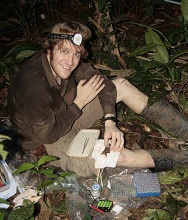Research interests
- Habitat fragmentation
- Frugivorous bats
(Phyllostomidae: Stenodermatinae &
Carolliinae) - Movement ecology
- Population genetics

Scientific projects
Habitat fragmentation caused by changes in land use has reached critical levels, with devastating consequences for the diversity and functionality of ecosystems, particularly in the species-rich tropics. Consequences for animal populations are well studied for many terrestrial taxa. However, highly mobile flying vertebrates, such as bats, have been largely neglected as they are considered resistant to fragmentation.
The focus of my study is habitat fragmentation and its effects on neotropical frugivorous bats in the Caribbean lowlands of Costa Rica. This area suffered strong anthropogenic impact as it is one of the main production sites for banana and pineapple in Costa Rica.
First, I study movement patterns of the small Phyllostomid bat, Dermanura watsoni, in forest fragments. Despite their ability to fly, understorey frugivorous bats especially may be edge-sensitive and reluctant to cross open spaces. I used radiotelemetry to assess whether D. watsoni is restricted to a single forest patch while foraging or commutes between various sites. Furthermore I am interested in what kinds of anthropogenically modified landscapes are entered and which are avoided.
Second, I focus on fragmentation effects at the population genetic level. Habitat disruption and degradation might lead to population differentiation and loss of genetic diversity as a consequence of reduced gene flow and elevated genetic drift. I selected the small frugivores Dermanura watsoni and Carollia castanea to assess whether habitat fragmentation leads to genetic population differentiation on a small geographic scale of only a few kilometers. Furthermore I include habitat and matrix parameters into the analyses to explain the genetic diversity of individual populations.
I combine ecological and molecular approaches to reveal the short- and long-term consequences of habitat fragmentation for frugivorous bat populations. My results shall help to develop strategies for successful bat conservation.
Publications
Ripperger SP, Kalko EKV, Rodríguez-Herrera B, Mayer F, Tschapka M (2015) Frugivorous bats maintain functional habitat connectivity in agricultural landscapes but rely strongly on natural forest fragments. PLoS ONE 10:e0120535
Ripperger SP, Heymann EW, Tschapka M, Kalko EKV (2014) Fruit characteristics associated with fruit preferences in frugivorous bats (Phyllostomidae: Stenodermatinae and Carolliinae) and Saddle-Back Tamarins (Saguinus fuscicollis) in Perú. Ecotropica 20: 53-63
Ripperger SP, Tschapka M, Kalko EKV, Rodríguez-Herrera B, Mayer F (2014) Resisting habitat fragmentation: high genetic connectivity among populations of the frugivorous bat Carollia castanea in an agricultural landscape. Agriculture, Ecosystems and Environment 185:9–15
Ripperger SP, Tschapka M, Kalko EKV, Rodríguez-Herrera B, Mayer F (2012) Life in a mosaic landscape: anthropogenic habitat fragmentation affects genetic population structure in a frugivorous bat species. Conservation Genetics DOI 10.1007/s10592-012-0434-y (online first)
Ripperger, SP (2011) Seeds of Amazonian Plants. Review. Ecotropica 17: 103-105
Conference contributions
Ripperger SP, Kalko EKV, Mayer F, Tschapka, M (2013) Space use in fragmented habitats: responses of a frugivorous bat species to an anthropogenic landscape. Talk presented at the annual conference of the Society for Tropical Ecology, gtö, Vienna, Austria
Ripperger SP, Tschapka, M, Kalko EKV, Mayer F (2013) Anthropogenic habitat fragmentation: genetic consequences in two frugivorous bat species. Talk presented at the 3rd International Berlin Bat Meeting, Berlin, Germany
Ripperger SP, Tschapka, M, Kalko EKV, Mayer F (2013) Differential effects of habitat fragmentation on population genetics in two frugivorous bat species. Talk presented at the German meeting of bat researchers, Rottenburg-Ergenzien, Germany
Vollstädt M, Graiff A, Ripperger SP, Renner S, Tschapka M (2012) Habitatfragmentierung und Infektion von Regenwaldvögeln mit Blutparasiten (Sporozoa: Haemosporida) in Costa Rica. Poster präsentiert auf der Tagung der Deutschen Ornithologen-Gesellschaft, DO-G, Saarbrücken, Deutschland
Ripperger SP, Tschapka, M, Kalko EKV, Mayer F (2012) Effects of habitat fragmentation on the genetic population structure of the frugivorous bat Dermanura watsoni (Phyllostomidae). Talk presented at the annual conference of the Society for Tropical Ecology, gtö, Erlangen, Germany
Ripperger SP, Tschapka M, Ganzhorn JU, Heymann EW, Kalko EKV (2009) Fruit choice and nutritional ecology of bats and tamarins. Poster presented at the German meeting of bat researchers, Frauenwörth, Chiemsee, Germany
Contact
- Dipl. Biol. Simon Ripperger
- Institute of Experimental Ecology
- University of Ulm
- Albert Einstein Allee 11
- D 89069 Ulm, Germany
- Tel. +49 (0)731 50 22669
- Fax +49 (0)731 50 22683
- Office: M25/5, 5xxx
